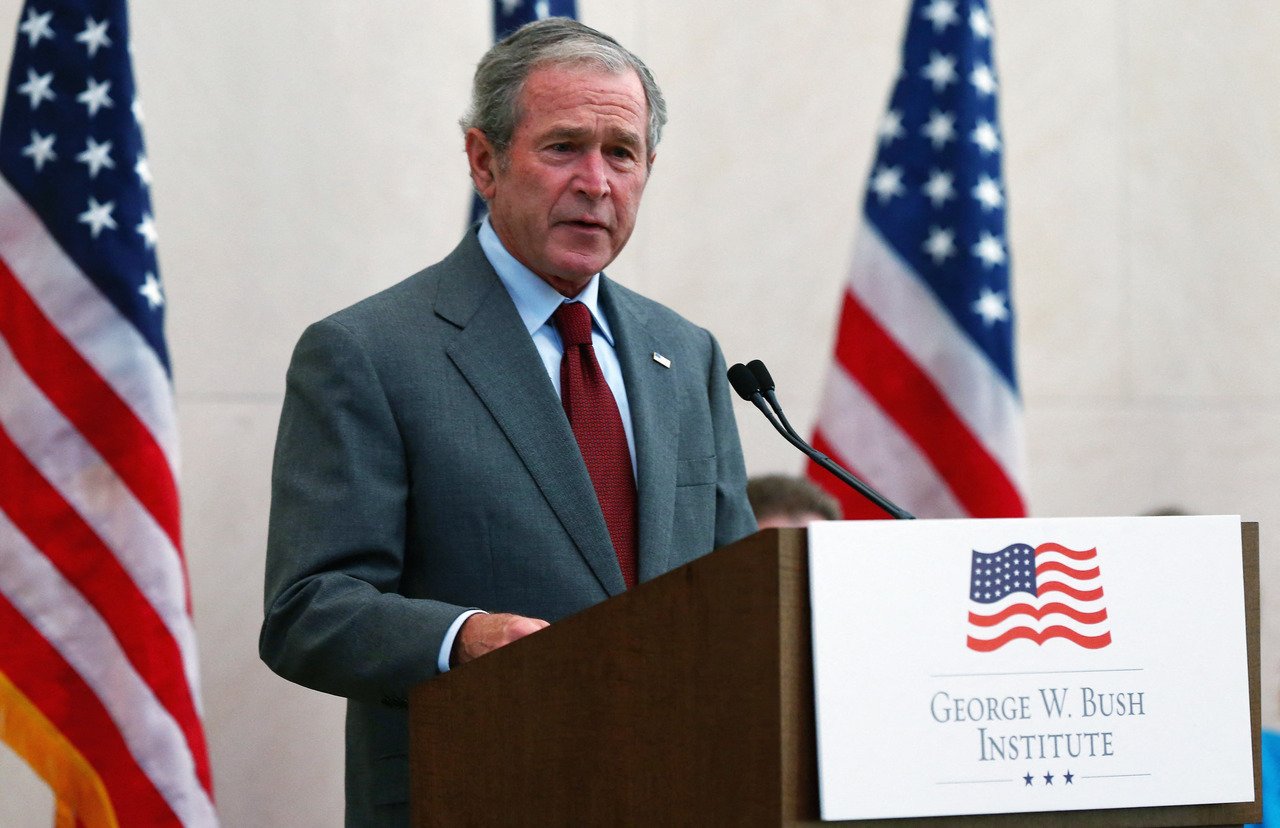Immigration thrust a new facet to troubled former president Bush's reputation
Sign up now: Get ST's newsletters delivered to your inbox

Former US president George W Bush is enjoying a resurgence of sorts in the aftermath of Mr Trump's erratic tenure.
PHOTO: AFP
Follow topic:
WASHINGTON (AFP) - Out of office for a dozen years and still castigated for his "war on terror," former United States president George W Bush has resurfaced as a passionate immigration advocate just as his Republican Party careens in the opposite direction.
The 74-year-old Texan, whose disastrous invasion of Iraq and failure to implement immigration reform helped give rise to Mr Donald Trump, is enjoying a resurgence of sorts in the aftermath of Mr Trump's erratic tenure.
US troops in Afghanistan, the "forever war" of Mr Bush's presidency, now face a September pullout under Democratic President Joe Biden.
With Mr Bush nostalgia evident, the 43rd president who normally lays low has released "Out of Many, One," featuring 43 of his own oil paintings of immigrants he has come to know.
In a Washington Post op-ed column last week Mr Bush said he compiled the book of portraits of immigrants who have embraced their adopted country as a way to help lower the temperature and "humanise the debate on immigration" in America.
But the man who once served as governor from a state on the front lines of the political fight over border security also unleashed fierce criticism of his own party and its antagonistic anti-immigrant stance.
The GOP has become "isolationist, protectionist, and to a certain extent nativist," Mr Bush said this week in an NBC Today interview.
Mr Bush supports a pathway to citizenship for millions of undocumented workers if they pay back taxes and have a clean background check. He advocates for visa reform and is backing the DACA program, which offers protection from deportation and permission to work for people who arrived without papers as children.
Such positions have put Mr Bush at odds with his party's base, and align more with the progressive immigration ideals of Democrats - many of whom were fierce enemies of Bush when he was commander in chief.
Mr Bush has made rare mention of Mr Trump, who exploited their party's worst xenophobic impulses. And Mr Bush acknowledged his own views - "border enforcement with a compassionate touch," he said - are not likely to change minds in the most inflexible quarters.
"I'm just an old guy they put out to pasture," he observed.
Salvage his legacy
Mr Bush's book, plus a media barrage including appearances on morning TV, late-night talk shows and radio, may be part of a larger strategy.
The effort could be aimed at an improbable transition from scorned architect of the wars in Iraq and Afghanistan, which cost extraordinary blood and treasure and gave rise to the Islamic State and other anti-American extremist groups, to elder statesman.
"Part of what he's doing here may be to salvage his legacy," Mr Christopher Devine, assistant professor of political science at the University of Dayton, told AFP Friday.
"We reinterpret previous presidents in the context of our own times," he added. "Bush might have seemed extreme, but people see what comes afterwards and they see it differently."
With the attacks of September 11, 2001, Mr Bush suddenly led an American citizenry united in purpose.
But eight years later, mired in Iraq and Afghanistan, Bush left his country more divided than at any time in living memory - a legacy that only presaged the turbulence of the Trump presidency.
Mr Bush's foray into Afghanistan came back into focus last week, with Biden announcing he would withdraw all US troops from the country by Sept 11, the 20th anniversary of the 9/11 attacks.
Mr Bush said the announcement left him "deeply concerned," and his mind turned to Ms Roya Mahboob, an Afghan refugee whose portrait he painted for his book, and to her former countrywomen.
"My first reaction was, wow these girls are going to have real trouble with the Taliban," Mr Bush told NBC.
The toll of US engagement in Iraq and Afghanistan has been staggering: a combined 6,800 Americans dead, along with hundreds of thousands of other fatalities, and trillions of dollars in US spending.
Mr Bush faced accusations that torture and other human rights violations were committed on his watch. Nations blamed him for trampling on the Middle East and beyond.
"Bush and many others overreacted to 9/11," said Mr William Banks, professor emeritus of law at Syracuse University's Maxwell School of Citizenship & Public Affairs.
"I blame him and especially (vice president) Dick Cheney and then (defense secretary) Donald Rumsfeld for the reckless policies," Mr Banks said.
But Mr Bush was "never nativist," and his recent efforts on immigration are not a "whitewashing" of history but appear to be a genuine effort at problem-solving, the professor added.
"After four years of Trump, Bush 43 looks like Churchill," Mr Banks said, referring to Britain's revered mid-century prime minister.

